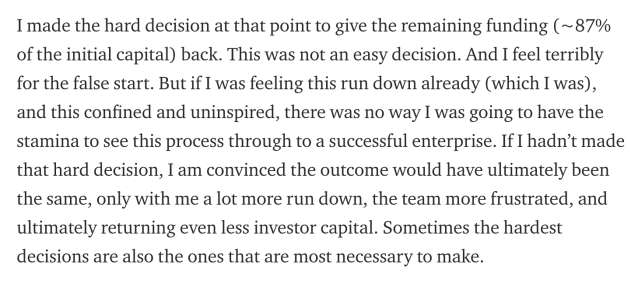
Fred Wilson’s ‘Pivot or Fail‘ post earlier this week was especially timely for me. Now that my friend Jason Jacobs shared his own experience of winding down Two Way Labs, I can more easily contribute my opinion with a specific example. As Jason wrote:

Across our first 45 core investments (Funds I and II), we’ve had three winddowns which come to mind. One was the result of a cofounder breakup. The other was a combination of struggling to find PMF and the realization by the CEO that she didn’t want to run this type of business. And most recently, Jason’s, which he describes in the link above. All three were very much the right decision.
Only Jason’s was in the “hard pivot” category that Fred describes (“Changing the product, market, and business entirely. Essentially starting over from scratch.”) but we’ve definitely had some “soft pivots” which probably should have just been shutdowns and some “soft pivots” which resulted in tremendous successes. When they’re at seed stage, we’re deferring to the founders’ decisions but also trying to help them understand the challenges associated with a hard pivot if their cap table isn’t supportive of the direction.
Sometimes founders think their VCs want the hard pivot – that the goal is to keep the company alive no matter what – or that if they don’t show ‘grit’ they’ll never get funded again. My opinion? Startups are really hard. If you don’t have a mission or problem you’re passionate about, where investors are aligned on the business, and it’s still early stage, you’re better off returning the cents on the dollar. We’re prepared to take the risk and redeploy.
At the same time, investors should give the founders some space to figure out if they want to push on or not. A “hard pivot” sometimes requires laying off the rest of the team and getting back to the garage days of idea generation. Doing that for 30, 60, 90, 120 days isn’t a waste if the founders are inspired and want to continue working together. But I’d suggest at the end of that they “re-pitch” their lead investor(s). If they’re not supportive it can be easier to restart the business altogether with the new idea than it is to push onward.